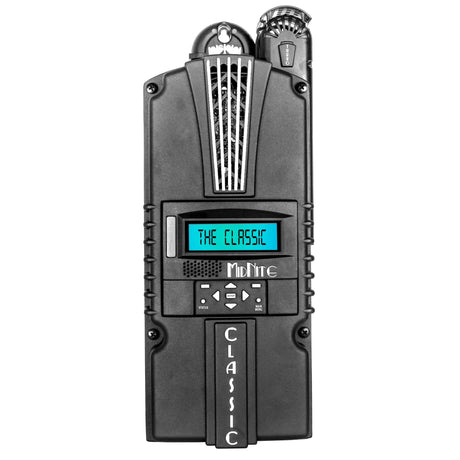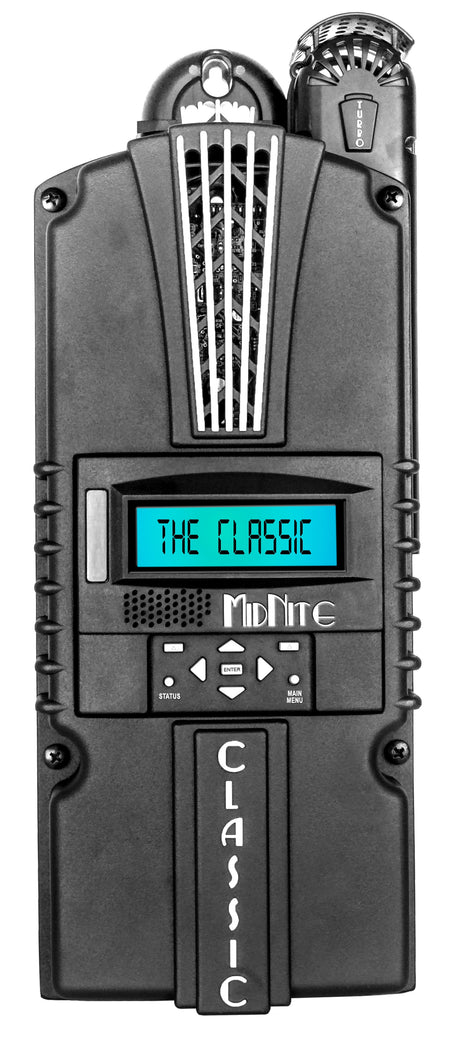- 25% off
Midnite Solar
$599.99$799.99Unit price /Unavailable - 24% off
Midnite Solar
$702.99$925.00Unit price /Unavailable
What Is Battery Charging?
Solar battery charging is the process of using solar energy harnessed by panels to charge the batteries.
Thanks to this renewable energy storage, you can rest assured your appliances will work even when the sun isn’t shining.
How Does Solar Battery Charging Work?
To understand how solar battery charging works, let’s first see what the solar battery charging system components are:
- Solar panels
- Charge controller
- Solar batteries
Solar panels soak up sunlight, generating direct current (DC) electricity, which is then converted into usable alternating current (AC) electricity by the solar inverter.
The charge controller connects solar panels and the solar battery storage, regulating the solar battery charging voltage and protecting batteries from overcharging.
Batteries store extra energy accumulated during the daytime, saving it for later. This is especially important for off-grid solar systems since they’re completely independent from the electrical grid.
Different Types of Solar Batteries
Here are the different types of solar panel storage batteries:
- Lithium-ion (Li-Ion) batteries. These store large amounts of solar power thanks to their high energy density.
- Lithium-iron phosphate (LFP) batteries. These are more eco-friendly and have a longer lifespan.
- Lead-acid batteries. These offer short bursts of energy.
- Flow batteries. These are low-maintenance and completely recyclable but take up a lot of space due to their low energy density.
- Saltwater batteries. These are another eco-friendly solution, as they use salt water as an electrolyte.
- Nickel-cadmium batteries. Despite their long lifespan, these aren’t suitable as solar batteries for home use because of cadmium’s toxicity.
4 Key Benefits of Solar Battery Charging
The key benefits of solar battery charging include cost savings, energy independence, backup power supply, and eco-friendliness.
Let’s take a closer look at them:
1. Cost Savings
Battery charging allows you to store energy instead of sending it back to the grid. This way, you can use it during peak hours without paying higher electricity rates.
2. Energy Independence
With solar battery storage, you can produce and store your own renewable energy. This independence gives you complete control over your power supply, allowing for a sustainable life at lower costs.
3. Backup Power Supply
With a solar battery charging kit, a solar system turns into a closed loop and continues to supply your home with energy during power outages. With this in mind, you can rest assured that you’ll always have a reliable power source, even during emergencies.
4. Eco-Friendliness
A battery charging system minimizes your need to rely on pollution-inducing fossil fuels. Simply put, it allows you to use clean energy around the clock.
How To Choose the Right Solar Battery for Your Needs
To choose the right solar battery for your needs, you need to consider its lifespan, capacity, cost, and efficiency.
Let’s explore these factors in more detail:
1. Lifespan
A solar battery’s life shortens with each daily charge and drain cycle, losing its ability to hold a charge over time. A battery’s lifespan depends on numerous variables, including its brand, cyclic life, and depth of discharge.
2. Capacity
Your choice of a solar battery primarily depends on how much solar energy you need to store. For example, solar battery capacity should be larger for an off-grid system powering an entire household than for one that only requires backup energy during outages.
3. Cost
The price of a solar battery depends on its type and brand. Some are costly upfront but last longer and perform better. That said, you need to weigh the long-term benefits against the initial investment to make the best choice.
4. Efficiency
Solar battery efficiency is the usable percentage of the power it takes to charge the battery. For instance, if you get 9 kWh of power out of your battery after feeding 10 kWh into it, its efficiency is 90%.
Battery Charging FAQ
1. How do you charge solar batteries?
Solar batteries are charged through the energy generated by solar panels. Panels convert sunlight into electrical energy, which is then sent through a charge controller to safely charge the batteries.
2. Should solar batteries be charged to 100%?
Solar batteries shouldn’t be charged to 100% all the time. In fact, it’s usually best to charge them to 80% or 90%. This way, you’ll prolong their lifespan and prevent solar battery charging problems.
3. How do I know my solar battery is fully charged?
You can know your solar battery is fully charged by monitoring the charge level through the system’s display or a monitoring app. Most modern systems have built-in indicators showing the battery’s charge status.
4. What is the best battery for solar charging?
Lithium-ion (Li-Ion) batteries are generally the best for solar charging because of their high efficiency, long lifespan, and lighter weight. They also offer better overall performance and faster charging times.
5. How long does it take to charge a solar battery fully?
It can take anywhere from four to eight hours of sunlight to fully charge a solar battery. However, the exact time depends on several factors, such as the battery’s capacity and the panels’ output.
6. Can I charge my solar battery overnight?
You can’t charge your solar battery overnight because the panels need sunlight to generate electricity used for charging. Still, you can use grid power to charge your battery when there’s no sunlight.
7. How do I know how many batteries I need for my solar system?
To determine how many batteries you need for your solar system, calculate your daily energy usage and the depth of discharge of the battery. Then, multiply your energy consumption by the number of days you want your system to power your home without sunlight.
8. Can solar batteries be used for off-grid homes?
Yes, solar batteries can be used for off-grid homes. In fact, they’re essential for them, as they store energy for use when the sun isn’t shining, like during nighttime and cloudy days.
Disclaimer: The content on Portable Sun is for informational purposes only. Electrical work can be dangerous—always consult a qualified professional. We are not liable for any injuries, damages, or losses from installation or use. Always follow local regulations and safety guidelines when handling electrical components.


